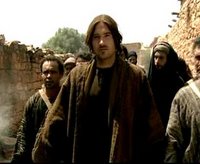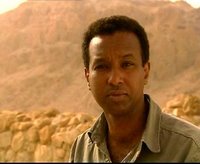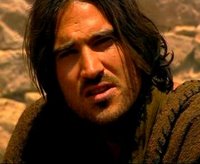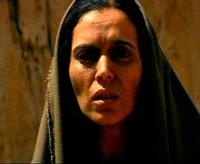The Miracles of Jesus - Review
 Religious broadcasting tends to fall into four categories. On the one hand there are the church owned stations who present a mix of sermons, worship and chat shows on satelite and cable. Then there are the programmes on our national TV which consist of either more chat shows, “Songs of Praise” type worship coverage, or historical documentaries.
Religious broadcasting tends to fall into four categories. On the one hand there are the church owned stations who present a mix of sermons, worship and chat shows on satelite and cable. Then there are the programmes on our national TV which consist of either more chat shows, “Songs of Praise” type worship coverage, or historical documentaries. At first glance, The Miracles of Jesus would appear to fit into this final category – historical documentaries. However, on closer inspection it turns out to be something different altogether, an exploration not of the historicity of Jesus’s miracles, but of their theology. Furthermore, this theological discussion has not been tucked away in some obscure, late-night slot, but in Sunday Evening prime-time.
 Such programming is risky. Setting aside the (non?)-religious zealots who want to see all religious programming barred from the air waves, there is also the challenge of how to make such a programme appeal to non-church goers, without gaining criticisms of being too lightweight or not Christian enough from the faithful. By and large The Miracles of Jesus pulls off this delicate balance admirably. The programme presented the questions in a way that was straightforward and clear, and yet even those with theological experience will have come away with some new ideas to think about. Personally I didn’t particularly like the use of “Time Slice” technology a la The Matrix, but I can appreciate how it might engage those who don’t normally watch programmes about theology.
Such programming is risky. Setting aside the (non?)-religious zealots who want to see all religious programming barred from the air waves, there is also the challenge of how to make such a programme appeal to non-church goers, without gaining criticisms of being too lightweight or not Christian enough from the faithful. By and large The Miracles of Jesus pulls off this delicate balance admirably. The programme presented the questions in a way that was straightforward and clear, and yet even those with theological experience will have come away with some new ideas to think about. Personally I didn’t particularly like the use of “Time Slice” technology a la The Matrix, but I can appreciate how it might engage those who don’t normally watch programmes about theology.Unusually, for this type of programme, there are no interviews with various academics. Otherwise the documentary follows a familiar format. The presenter, former BBC Middle East correspondent Rageh Omaar, wanders around the original locations, narrating various accounts and offering a few explanations. This footage is interspersed with acted out reconstructions of how these events might have happened.
 Time Slice photography aside, these reconstructions are fairly strong. Taking a lead from Mel Gibson’s The Passion of the Christ, Jesus and his disciples speak in Aramaic. The portrayal of Jesus here is fairly unusual. Firstly, the actor playing him (George Calil) is half Lebanese. Furthermore, Jesus’s hair is fairly short (although, curiously not as short as the previous documentary by these film-makers suggested it should have been), and he wears stubble rather than a beard. As this footage unfolds we also see that this Jesus is a man of action. He is strong, well built, and acts with confidence and purpose.
Time Slice photography aside, these reconstructions are fairly strong. Taking a lead from Mel Gibson’s The Passion of the Christ, Jesus and his disciples speak in Aramaic. The portrayal of Jesus here is fairly unusual. Firstly, the actor playing him (George Calil) is half Lebanese. Furthermore, Jesus’s hair is fairly short (although, curiously not as short as the previous documentary by these film-makers suggested it should have been), and he wears stubble rather than a beard. As this footage unfolds we also see that this Jesus is a man of action. He is strong, well built, and acts with confidence and purpose.Whilst the programme primarily reconstructs scenes from Jesus’s life, it also supplements these with episodes from the lives of Moses, Joshua, Elijah, and Paul. One of the major points that is made is that some of Jesus’s miracles were not simply signs of God’s power, but also prophetic acts which spelt out who he was to those who surrounded him.
 It’s also not afraid to tackle difficult passages. The second programme, arguably the most complex as it examines Jesus self-awareness regarding his divinity, considers Jesus’s treatment of the Syro-Phoenician woman. Geza Vermes in his groundbreaking book “Jesus the Jew” suggest that here Jesus exhibits xenophobia. Whilst this is only implied here, it is an uncompromising portrayal of one of the gospel’s most troubling episodes.
It’s also not afraid to tackle difficult passages. The second programme, arguably the most complex as it examines Jesus self-awareness regarding his divinity, considers Jesus’s treatment of the Syro-Phoenician woman. Geza Vermes in his groundbreaking book “Jesus the Jew” suggest that here Jesus exhibits xenophobia. Whilst this is only implied here, it is an uncompromising portrayal of one of the gospel’s most troubling episodes. The final programme moves on to look briefly at Jesus’s death and resurrection, before investigating the birth of the church at Pentecost, and the ministry of Paul. Again this is theological territory, as opposed to historical ground. Throughout the series, Omaar is at pains to stress that it’s not so much whether these events actually were miracles that is important, but that those who witnessed them were. In other words we are looking at the theology of these events.
 Perhaps one weakness in this regard is that the programme never goes into the idea of literary creation. Whilst this card has been strongly overplayed in some circles (because as NT Wright notes, Jesus was just as capable of being a thinking theologian as his later followers), it’s certainly plausible that some of the more incidental similarities between Jesus’s miracles and their Old Testament counterparts were due to his biographers’ alterations. It’s a distinction that would have been useful, even though it is obviously impossible to do for each individual miracle.
Perhaps one weakness in this regard is that the programme never goes into the idea of literary creation. Whilst this card has been strongly overplayed in some circles (because as NT Wright notes, Jesus was just as capable of being a thinking theologian as his later followers), it’s certainly plausible that some of the more incidental similarities between Jesus’s miracles and their Old Testament counterparts were due to his biographers’ alterations. It’s a distinction that would have been useful, even though it is obviously impossible to do for each individual miracle.Overall though, there are relatively few quibbles with the series as a whole, and it is to be hoped that the BBC were sufficiently encouraged with the audience and the feedback that the programme has received to continue to make this type of programme.
Labels: Documentaries














4 Comments:
At 1:19 pm, September 05, 2006, Mark Goodacre said…
Mark Goodacre said…
Matt -- many thanks for the interesting review; I am looking forward to catching this documentary at some point. All best, Mark
At 1:21 pm, September 05, 2006, Mark Goodacre said…
Mark Goodacre said…
PS: you have a typo -- it should be "by and large".
At 1:38 pm, September 05, 2006, Matt Page said…
Matt Page said…
Corrected, thanks!
By the way, apparently this has already been shown in the US. The Discovery Channel were partners in the project, and they showed it just before Christmas. That said the version they showed was fronted by illusionist Brock Gill, rather than Rageh Omaar.
Matt
At 10:41 pm, May 04, 2023, Gary said…
Gary said…
Why is that the "big" miracles today (receiving an appearance from a dead person; being cured of an inability to walk) only happen to Pentecostals and Roman Catholics? What is the explanation for this??
https://lutherwasnotbornagaincom.wordpress.com/2023/05/04/where-are-all-the-episcopalian-presbyterian-and-lutheran-miracles/
Post a Comment
<< Home